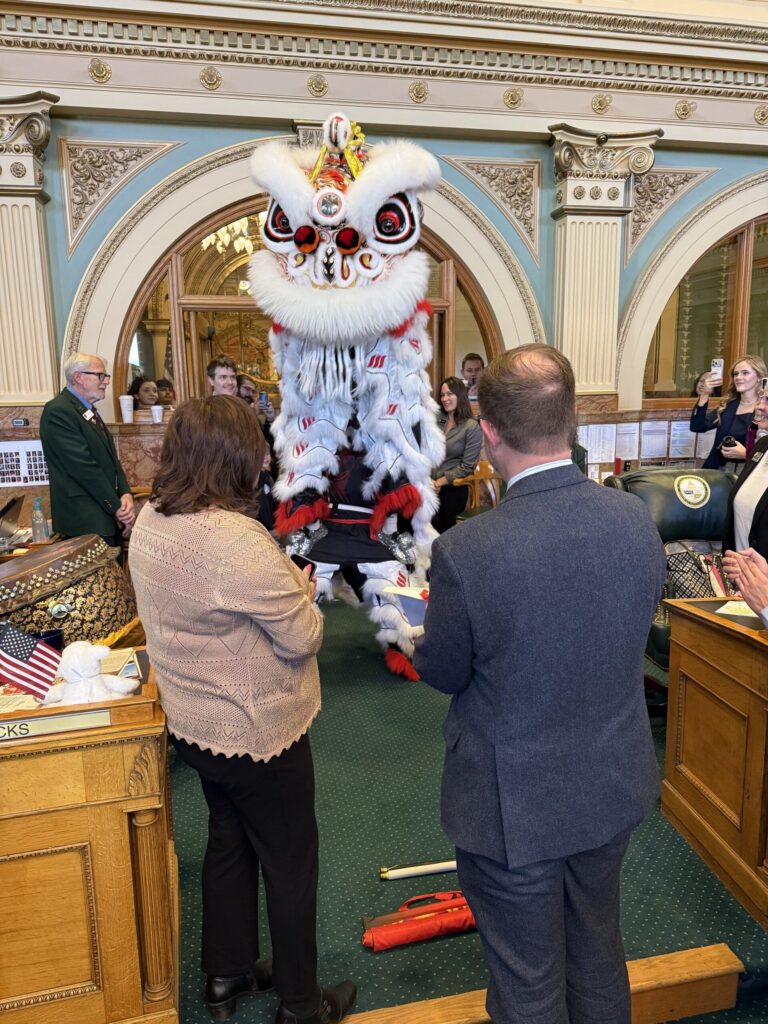Senate is poised to tackle collective bargaining bill that applies only to counties

Collective bargaining for county workers, one of the biggest bills introduced in the last two weeks of the session that won party-line approvals in committees, is now ready for the full Senate’s consideration.
Lawmakers from both sides of the aisle expect an intense debate on Senate Bill 230, which would allow county workers to form unions and engage in collective bargaining with their employers, a right they already have. In fact, four counties – Pueblo, Adams, Summit and Las Animas – already have collective bargaining agreements with their employees.
The bill’s sponsors, Senate President Steve Fenberg of Boulder and House Majority Leader Daneya Esgar of Pueblo, told Colorado Politics the state needs to affirm that right through state law. Esgar earlier noted that it’s currently up to each individual county leadership to decide if their workers can avail of collective bargaining.
“We’re saying as a state, all county employees have this right. Just because there’s good acting counties already doesn’t negate the need for this in other areas, where maybe there’s not good acting county commissioners,” she said.
SB 230 has been in the works for the last two sessions, starting out as a plan a year ago to allow all public sector employees to engage in collective bargaining. That would have included those who work for municipalities, counties, special districts, K-12 schools and public colleges and universities. As the bill got closer to introduction this year and the opposition grew, including from some quarters in organized labor, the bill was narrowed down first to just counties and higher education, and then to its final version, which only applies to counties and their roughly 38,000 employees.
Bill sponsors told Colorado Politics they negotiated primarily with a small group of mostly Democratic county commissioners representing the Counties and Commissioners Acting Together (CCAT), and not with Colorado Counties, Inc. (CCI), which represents 62 out of the state’s 64 counties. The latter has been firmly opposed from the beginning. The former isn’t in favor either. Officially, the organization holds an “amend’ position.
The bill received a party-line 3-2 vote from the Senate Business, Labor & Technology Committee on Wednesday and also a party-line 4-3 vote from Senate Appropriations on Friday morning.
Fenberg said during Wednesday’s hearing that since CCI is opposed, there was little point in trying to negotiate with the group.
Wednesday’s hearing started off with an unusual move by Sen. Rob Woodward, R-Loveland. Before the committee’s chair had the opportunity to call for the first of several bills on the calendar, Woodward made a motion to send SB 230 to the Senate Local Government Committee in a move colloquially referred to as a “supermotion.” It’s a non-disputable motion, but one that failed on a party-line 2-3 vote.
Once that motion failed, SB 230 was ready for its hearing.
The bill is very similar to the 2021 bill that granted state employees the ability to engage in collective bargaining, with Colorado WINS as the union, Fenberg said.
However, SB 230 does not favor any organization to be the union that represents county workers, Fenberg told the business committee Wednesday. The measure does not create a union, it just creates the option, he said.
Once the workers decide to form a union through an election, they would negotiate a contract – which Fenberg said the county could reject.
“I don’t think this will create many unions,” he said, adding the bill is about rights, respect and a level playing field.
Union leaders, including AFL-CIO Colorado, threatened Democratic lawmakers last year that they would withhold campaign contributions until May 2022 because the unions felt their interests had been excluded, according to the Colorado Sun.
Many see SB 230 as part of an effort to repair that relationship.
Out of the five dozen witnesses who signed up to testify Wednesday, only a dozen were in favor of the bill – almost all union leaders or representatives. Only two of those who spoke in favor are former county employees and not currently affiliated with a union.
Among the first witnesses to testify on the bill was Sheriff Joe Pelle of Boulder County, who also represented the County Sheriffs of Colorado.
Pelle said the bill does not respect the autonomy of sheriffs, who hire, train, promote and even discipline their own employees. The county should not negotiate any of those policy or workplace condition contracts for sheriff employees, he added.
“My experience with union contracts is that they add layers of complexity and time,” he said, adding it affects the ability of chief law enforcement officials to manage their departments. He asked that the sheriffs be exempted from the bill.
The Colorado Municipal League’s Kevin Bommer also testified against the bill, although municipalities are no longer included in the legislation.
“Local governments either hang together or hang separately,” he said, arguing this is a local control issue that should be left to the local leaders.
Dozens of county commissioners lined up to talk about the bill’s unfunded mandate, pointing out the law will cost counties money they don’t have and could result in either tax hikes, layoffs or cutbacks in services.
Former Senate President and now Fremont County Commissioner Kevin Grantham and three El Paso County commissioners, including Commissioner Holly Williams, emphasized that point.
“Our citizens will never get the bill for an 8% increase in the mail,” Williams said.
Instead, services will be affected, whether road repairs, emergency services or community-based policing, she said, adding the proposal will be the single largest unfunded mandate in history and will be paid for by residents.
The process for getting people’s input also became a major issue during the hearing.
Logan County Commissioner Byron Pelton said some counties were invited to engage, but most were not.
“We’ve never had a full ability to sit down or convey our concerns,” said El Paso County Commissioner Carrie Geitner. “It was going to be done no matter how we felt.”
El Paso County Public Information Officer Ryan Parsell charged that the bill is written by someone with no experience in the technical day-to-day operations of county government.
Others argued the measure would preclude local governments’ ability to be flexible.
The union in Summit County only covers transit drivers, Elisabeth Lawernce, a Summit County commissioner, also said.
She said a union contract for all county workers would inhibit their ability to be nimble. This came up recently, she said, when she heard from the county sheriff who needed more money to keep three employees who were going to neighboring communities.
“We would not have that flexibility working in a union environment,” she said. “This is the wrong bill.”
Sen. Chris Kolker, D-Centennial, asked Lawrence and others commissioners if anyone had ever asked for a union or to collectively bargain. Lawrence responded that her county has limited ability to raise funds to cover the bill’s unfunded mandate. She is the one responsible for her county employees, she said.
“You’d better believe I’d hear from them if I wasn’t doing the best thing for them,” she said.
Others county officials argued the legislation would negatively affect local governments’ human resources operations.
There may be pockets of employees who are dissatisfied, and they may grumble amongst themselves, but the way the bill is written, human resources cannot respond to questions from those employees, said Larimer County Commissioner Christine Kuehnast.
Commissioners affiliated with CCAT – Democrats Andy Kerr of Jefferson County, Emma Pinter of Adams County, Claire Levy of Boulder County and Tamara Pogue of Summit County – also testified.
Kerr said the rights of employees should not be determined by the votes of others. That’s a reference to ballot initiatives, notably measures in Colorado Springs in 2019, and twice in Denver, where voters rejected collective bargaining for general local government workers.
Levy said CCAT’s concerns are based on “card check” and how an appropriate collective bargaining unit should be determined. Card check applies to requiring a majority of employees to sign a “card” – an authorization form – to say they want to be represented by a union. One bargaining unit, as defined in the bill, would require a minimum of 50 employees.
Levy said that under a card check mechanism, employees could be subjected to undue pressure to sign a card.
Summit County has a positive relationship with its transit union, Pogue said.
“The sky has not fallen,” she said, echoing concerns raised by Levy that small counties would have difficulty negotiating with multiple bargaining units.
Heather Burke, president of AFSCME local 3927 and an Adams County social worker, said they sought a seat at the table not to start a fight but to be hand in hand with the county. Prior to the agreement, workers were not allowed to speak up on policy when it did not serve clients, she said.
“We weren’t allowed to point out things not going well in child welfare, and if we did, we feared retaliation,” she said, adding that ahs changed since the agreement.
Burke also said county workers would not testify on the bill because of fears of retaliation. Only two former county workers not affiliated with unions, both from El Paso County, testified.
Josette Jaramillo, president of AFL-CIO Colorado, the Pueblo County AFSCME chapter, said no one wants to bankrupt counties. Employees give to their communities, working nights and weekends, she said.
“We’re not trying to get rich. We’re just asking for the conversation and fairness,” said the Pueblo County human services employee.
Brooke Youngburg, formerly an employee in El Paso County who left the job last year, also raised fears of retaliation
“You can be retaliated against or fired for speaking out against poor working conditions,” she said, adding management never bothers to learn what workers do, and when the latter voiced concerns about policies detrimental to their work, they are punished. She said employees work off the clock and don’t get paid for that work.
Brittany Williams, also a former El Paso County social worker, said she knows what it’s like to not have a voice in the job and not be respected by management. That, she said, leads to low morale.
Her job was threatened on multiple occasions, she told the committee.
“The best way I can describe it is that I was in a domestically-violent relationship with my job,” she said, adding that often means working for 60 hours a week and then getting punished for poor outcomes.
“If people aren’t clamoring for it, then there’s nothing to worry about,” Kolker said at the hearing’s conclusion.
The Senate Appropriations amended the bill to add $650,000 for state agency work, but nothing for the counties. Additional amendments are anticipated when the full Senate debates the bill.














